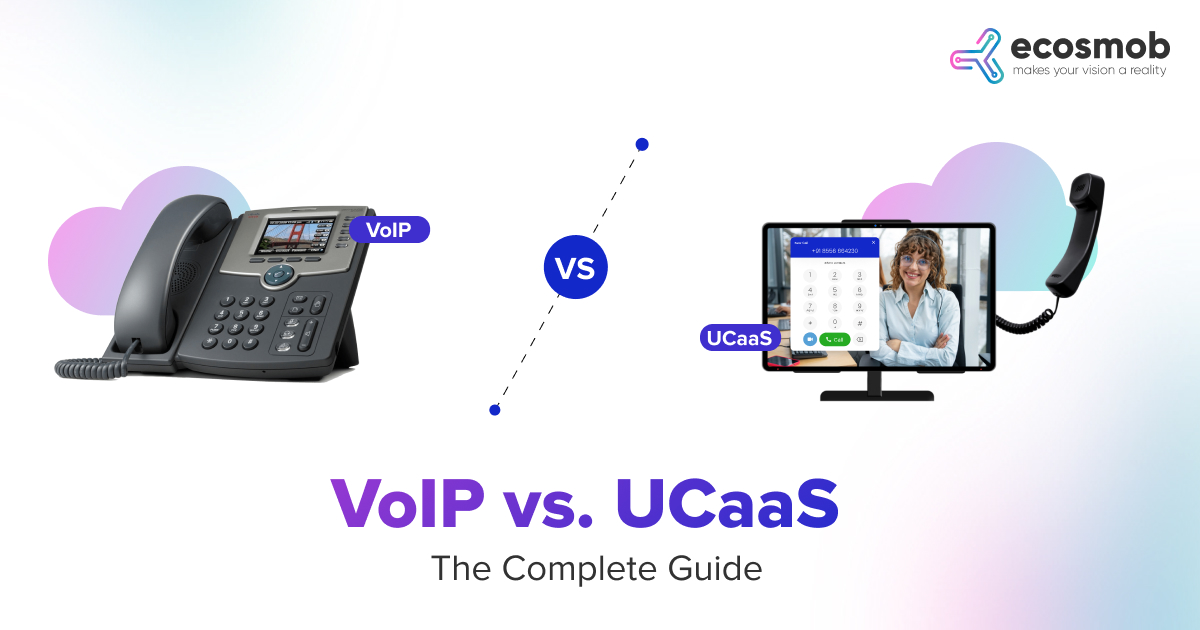Unified Communications Solution (UC) is the new buzzword in the telecom market. Industry insiders expect the UC markets to grow at a CAGR of 18.3% between 2021 to 2026. The rising demand for sophisticated communication solutions in the modern business landscape is a key driving force behind such exponential growth of UC.
Effective communication is the backbone of seamless business operations. A breakdown of the communication system means a loss of productivity and millions in revenue. When it is a sector like healthcare, an inefficient communication system means an even bigger risk and loss of precious lives. The healthcare industry in particular requires healthcare professionals to be agile in attending to patients. UC smart cloud-based solutions ensure healthcare workers have access to essential data of a patient in real-time.
The Unified Communications solutions provider helps the healthcare industry streamline and refine its communication processes by way of real-time communications, locating caregivers, enabling fast connections irrespective of location, remote consultancy services, and a lot more resulting in delivering better patient care.
Healthcare and Technology – A Brief History
Technology has played a major role in the growth and overall efficiency of the healthcare industry. It was in the early 90s that personal computers became affordable and the internet came on the scene. The Institute of Medicine proposed back then that every doctor’s office must use computers to improve patient care and the overall patient experience. Computers and the internet thus revolutionized the administrative processes in the healthcare space, which remained untouched for years otherwise. New ways to approach patient communication, appointment scheduling, and the keeping of patient records emerged overnight.
The first electronic health record (EHR) system was created in 1972 by the Regenstrief Institute. Given the high costs of EHR, it was only adopted by government hospitals and those willing to explore and invest in such expensive innovations. With the advent of the internet in the 90’s EHR transformed into web-based EHR systems. However, the widespread adoption of EHR systems is happening now, almost 20 years later throughout the U.S.
Today when we think about healthcare trending buzzwords such as digital transformation, patient engagement, virtual appointments, and big data flash across our minds. Today we see these terms being sparingly used in medical journals, news articles, research reports, etc. This is proof of how far the healthcare sector has come in delivering excellent care by partnering with technology.
Read our another blog on Powering Digital Transformation with Unified Communication
Why Unified Communications is Important in Healthcare?
EHR’s ability to integrate with systems of other institutions to get complete details of a patient’s medical history is still a big question mark. Pulling out the latest medical data from zillions of electronic notes is a big challenge. The EHR systems have not been able to fully extract the potential that could lead to better patient engagement.
There still exists a huge gap in these areas and UC has the potential to fill these gaps. By linking multiple devices, getting together different locations on a single network, and seamlessly integrating sophisticated apps (communication and data) in the healthcare space, UC ensures seamless collaboration, communication, and productivity, keeping the flow of knowledge intact. Unified Communication in healthcare sector can ensure better patient care and delivery outcomes at every stage of the patient’s journey.
To measure transformation in healthcare, one can evaluate how patient care is being delivered and the treatment prescribed. Unified communications solutions development helps provide meaningful insights into ‘patient interaction’ with the system.
Enhance Collaboration and Streamline Workflows in Healthcare. Take the First Step With Unified Communications.
The Emergence of UC in Healthcare
- Since its initial days, UC solutions have proven to be a cost-effective solution for small businesses across industries, such as Research, Education, BFSI, retail, etc. However, cloud delivery of UC offered by companies, such as IBM and many more are transforming the way healthcare organizations manage their communication networks.
- There is a pressing need for easy-to-maintain network systems that enable effective communication possible across the healthcare domain. The legacy systems really aren’t helping much in today’s fast-paced digitized environment. Subscription-based UC solutions are indeed a boon for the healthcare sector, as they are often known to have minimal budgets when it comes to communication technology and IT services.
Benefits of Unified Communications in Healthcare
Simplifies communication and enhances collaboration
Effective communication and collaboration between different departments in healthcare is the key to excellent patient care. One can’t afford errors as it is human life at stake. UCaaS makes it possible for the staff (doctors, nurses, admin) to consolidate all their communication tools for messaging, chats, and calling on a single device. In the past one had to use a system for emails, a pager for messaging and the desk phone for calls, imagine the hassle of navigating through multiple devices. By bringing all communication tools on a single device, UC not only simplifies communication but also enables better communication between different teams. Simple and seamless communication translates to better patient care and experience.
Increases functionality
Besides basic functions like calling and texting, UC enables video conferencing and calls as well. This is a big advantage when it comes to healthcare as it enables doctors to collaborate with fellow doctors, specialists, and patients when in-person meetings are not possible. Large hospital chains with a presence in multiple locations can leverage UC capabilities by having a shared phone service across locations. In unforeseen situations like a system failure or a power outage at one location network continuity will not be something to stress about. By forwarding calls to another location, hospitals can be assured of not missing out on any emergencies and important patient calls.
Enhances care quality
A healthcare facility with multiple branches may have specialists sitting in different locations. One facility may specialize in Nephrology and the other may specialize in pulmonary disorders. At times a patient’s case may have to be transferred to another facility due to some complications that cannot be addressed at his regular hospital facility. In such a case, all past health records of the patient have to be physically transferred to the new facility, and important information or reports may get lost in the process. However, with UCaaS, a patient’s entire health record can be electronically uploaded on a central system and access can be given to the concerned person at a different location instantly. This also applies in case of a city change. Doctors can then get on a video conference, to better understand the case and provide better care and treatment to the patient in question.
Cost-saving
UC solutions are cost-effective and easy to maintain over a full-blown on-premise telecom infrastructure. It also provides more value for the money spent and helps healthcare facilities and private doctor clinics to keep their overhead costs in control. Low overheads will translate to more affordable medical care benefiting the community at large. The medical fraternity is not averse to the benefits of UC and is eager to integrate UC services into the industry. UC can be a transformer in the real sense when it comes to the day-to-day functioning of healthcare facilities. It can enable the industry to save money, provide better patient care, enhance both internal and external communication, and can be a catalyst in collaborating with other healthcare facilities.
Improves patient experience
When we think and talk about healthcare it is not just efficiency but human lives too. UC ensures teams are connected 24×7 and communication never stops. By integrating all systems UC can also help automate certain tasks like booking appointments, assigning time slots so that precious time is saved and patients waiting time is reduced. A swift and non-stop communication channel also ensures faster response times and overall a much enhanced patient experience.
Also Read: Role of Video Conferencing in Healthcare
Access to all data in one place
With all the data in one place, pulling out reports, identifying patterns, planning, and strategizing becomes a breeze. UC can help hospitals with information on data points like potential health issues, recovery rates, percentage of people operated on, percentage of people cured by medication, etc. Such data can prove to be a gold mine for some significant research in the healthcare fraternity. From an administrative standpoint, hospitals can gather data on-peak hours for appointments, the number of last-minute cancellations and no-shows, and reasons for cancellations. The possibilities are just endless.
The way forward
The healthcare sector has always been open to embracing technology when it comes to medical treatments, research in medicine, and vaccines. However, they have now come to realize that technology can play a big role in uplifting their overall functioning. The adoption of cloud technologies in the form of EHR systems has paved the way for companies offering UC solutions to make their services available to healthcare facilities on a subscription model.
In the last two years, the healthcare infrastructure was burdened beyond what any one of us could have imagined. It truly was an eye-opener for a pressing need for seamless communication systems in the industry. Besides the many benefits we discussed here, the transformation that UC can bring in every aspect of healthcare largely remains untapped. Unified Communication solutions can emerge as a powerful tool that can aid the growth of the healthcare sector.










